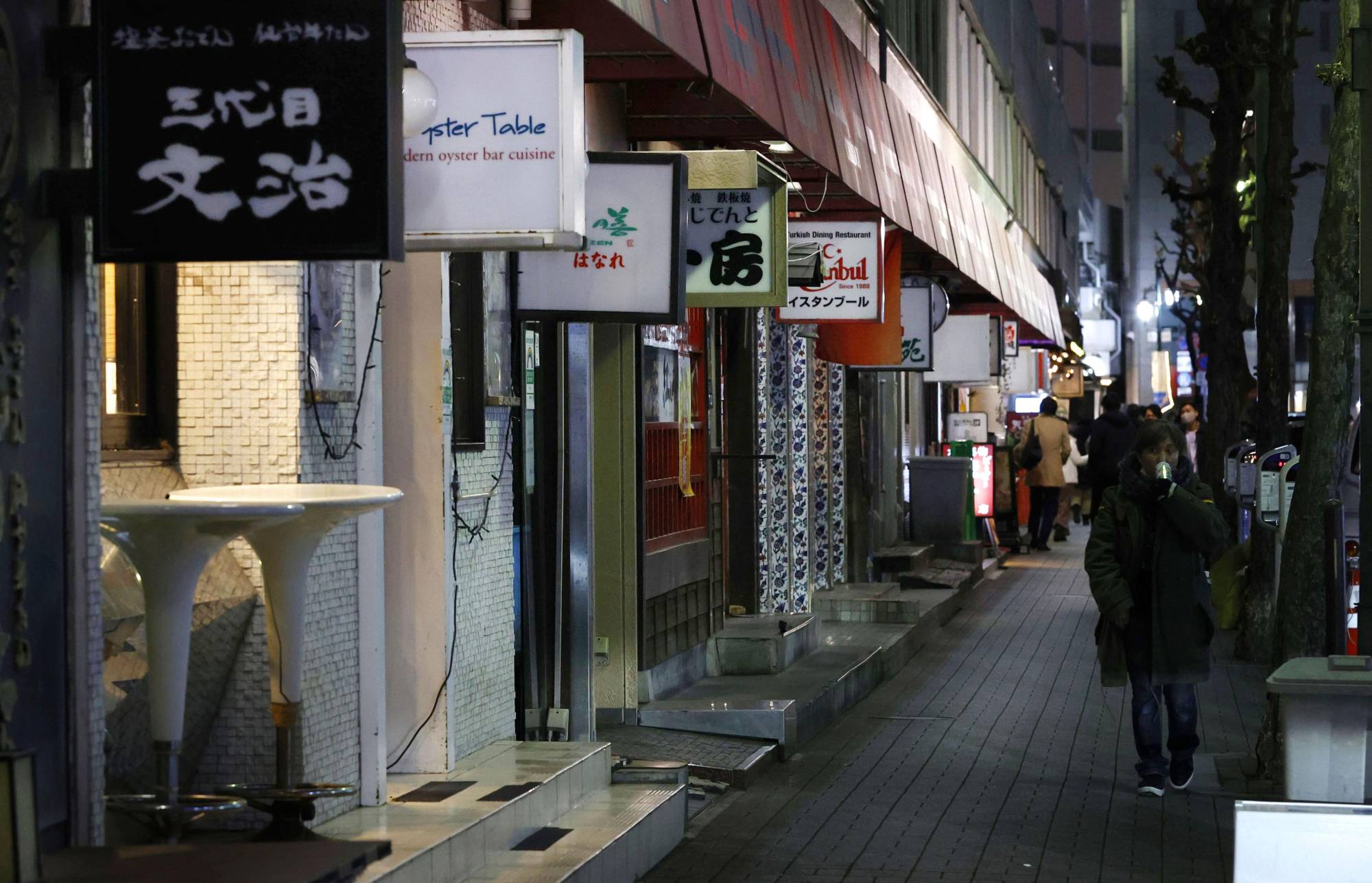
As Tokyo’s state of emergency compels restaurants to cut their business hours, suppliers may soon be eligible for financial aid, government sources said.
Under the plan, up to ¥400,000 will be given to small businesses and up to ¥200,000 to sole proprietors, informed sources said. The government is expected to announce the aid program after the end of the three-day weekend through Monday, the sources said.
Businesses eligible for the aid will include those whose sales have dropped by about half or more from January or February last year as a result of eateries shortening operating hours, the sources said. Possible recipients include suppliers that have direct business deals with eateries in Tokyo and three neighboring prefectures — Saitama, Chiba and Kanagawa — and indirect suppliers such as farmers and fishers.
All domestic firms will be able to receive the aid if they fulfill the required conditions, according to the sources.
On Friday, the government put Tokyo, Saitama, Chiba and Kanagawa under a state of emergency through to Feb. 7.
The government plans to cover costs for the aid with reserve funds under its fiscal 2020 budget and an unused portion of its coronavirus-related benefit program aimed at helping small businesses pay property rent, the sources said.
Payments are expected to start in March at the earliest as the government needs to make necessary preparations, such as choosing a company to conduct related clerical work and building a system for the program, according to the sources.
While the government is set to pay monthly benefits of up to ¥1.8 million each to restaurants and bars that comply with authorities’ requests for shorter operating hours, drawing up an aid program for businesses that supply them with food and other items has been an outstanding issue.
Even with the ¥1.8 million allowance, restaurant operators in the Tokyo metropolitan area are in a difficult position. While owners and managers are determined to survive, they are fearful customers may not return.

Many bars and restaurants closed at 8 p.m. in Tokyo’s Ginza district on Saturday in response to government requests to do so. | KYODO
The manager of a pub in an entertainment district in the city of Chiba voiced frustration, saying that authorities’ requests for shorter operating hours under the coronavirus emergency made him “feel that eating and drinking establishments are to blame” for the epidemic.
“I don’t understand much (about the requests) as they are not well-grounded,” he said, noting that the daily benefit of up to ¥60,000 per store from authorities for cooperating with the requests is not sufficient due to the high cost of rent.
Still, the manager decided to accept the government’s request and move up the pub’s closing time to 8 p.m. from midnight.
“I understand that everyone needs to cooperate (to contain the spread of the virus). We have no other choice but to fight and struggle,” he said.
Soshi Itoi, the 25-year-old owner of Italian restaurant Ambar Ginza in Tokyo’s posh Ginza district, decided to keep his restaurant closed for the time being.
“As we open at 6 p.m., we can operate only for two hours if we follow the requests,” Itoi said. “We can at least avoid falling into the red if we receive the financial aid,” he added.
Itoi has yet to decide when he will reopen the restaurant. “I wonder if we can contain infections in just one month,” Itoi said, adding that he may have to keep the restaurant shut longer if the state of emergency is extended.
“Even if we can survive the difficult situation using the financial support, I’m not sure whether customers will be back when we reopen,” he said.
Global-Dining Inc., which runs Italian restaurants and other eateries, decided to continue operating as usual.
“With the current levels of financial and other support from administrative authorities, we cannot accept the requests for shorter business hours,” Global-Dining President Kozo Hasegawa said on the company’s website.
“It’s impossible to maintain our business and employment if we have to close at 8 p.m.,” he added.
In a time of both misinformation and too much information, quality journalism is more crucial than ever.
By subscribing, you can help us get the story right.
Source: https://www.japantimes.co.jp/news/2021/01/10/national/tokyo-restaurant-suppliers-coronavirus-aid/



